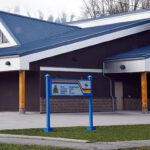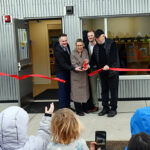Home »

FJMES students and Wild School Winter
On February 17, 350 students at Frank J. Mitchell Elementary School (FJMES) participated in several Wild School Winter stations experiencing ways to love being outside in winter.
“This was our kick-off event to a three-year Wild School program to get students outside, comfortably connecting with the nature in their backyard,” said lead teacher and coordinator Mardelle Sauerborn.
“Through this multi-year program Lee-Anne Walker, long-time naturalist and environmental educator, is our Wild School mentor. Ms. Walker will support teachers, primarily, implementing the new BC education curriculum by bringing students outdoors more often and into the community experiencing place-based learning,” said Sauerborn.

Walker said “one of the most exciting things about this special event was the support from community. Dozens of volunteers from the District of Sparwood, Sparwood Fish and Wildlife Association, Firefighters, FJMES PAC, Outdoor Connections, Fernie Alpine Resort ski patrol, and Teck gave tirelessly of their skills and energy to support these students outdoors, connecting with community and having fun learning together.” Students participated in engaging stations where they learned snow science, moving through snow, predator prey games, fire starting, quinzee building, tracking and trapping, as well as nature art and drama.
FJM principal Christine McKie noted, “the day could not have been more perfect for our Wild School kick-off event. The weather was amazing and students, staff, and volunteers had smiles on their faces all day long! I really enjoyed visiting stations and hearing our students talk about their favourite parts of the day.”
Throughout the next three years Sparwood can expect to see FJMES students outside more often connecting with nature, increasing their natural intelligence, and making connections between their well-being and health of our environment. Students will also become more active stewards of their environment through collaborations like the one with the Elk River Alliance at the Beaver wetland. Community members will see FJMES student ecosystem enhancement efforts on interpretive signs to be installed in April.
“Sparwood has a unique outdoor culture with a strong tradition of hunting and fishing, as well as both non-motorized and motorized outdoor recreation activities. Students will develop pride and demonstrate a caring attitude regarding Sparwood’s unique natural heritage,” says Sauerborn.
The Habitat Conservation Trust Foundation (HCTF) Wild School program is a three-year program providing teachers and students of K-8 schools with free resources, training and support for environmental learning, outdoor field experiences and connections to conservation work in their communities. The Wild School program is a multi-year model that incorporates healthy and sustainable initiatives toward connecting schools to nature.
“One of the key elements of the Wild School program is professional development. The shift from a one-day workshop model to providing multiple years of professional development opportunities – including workshops, mentoring, networking and support- has been shown to be more effective in helping teachers build capacity and transform their teaching and learning, leading to better outcomes for students,” said Walker, local Wild Schools facilitator. “Over the past nine years, the Wild Schools and Science in Action programs have helped 3,500 BC teachers in 267 schools provide hands-on environmental learning experiences to over 72,000 students.”
The Wild Schools program is funded by the Habitat Conservation Trust Foundation (HCTF). Since 1981, HCTF has provided more than $160 Million in project funding to more than 2,000 conservation, restoration, enhancement, and educational projects across BC. HCTF believes that investing in education is key to the future of conservation.
The Wild School program is just one of HCTF’s Education program areas; they also offer GO Grants to cover transportation and programming costs for getting students learning outdoors and Connect to Conservation, a forum to connect the education community with on-the-ground conservation work.
Submitted







